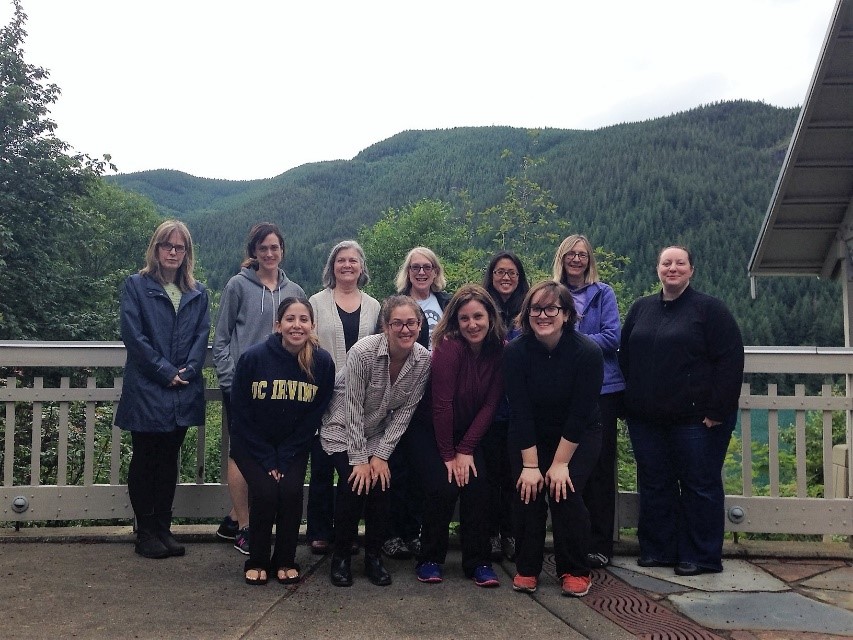by Alison L. Iser, Project Manager
Domestic Violence and Mental Health Collaboration Project

How can we help domestic violence survivors with high levels of chronic stress due to protracted custody battles with their abusive ex-partners?
How can service providers manage their own distress when they see yet another survivor suffering and know the survivor’s children are at risk?
The Domestic Violence and Mental Health Collaboration Project (Collaboration Project) grappled with these questions and found a promising strategy to address them – mindfulness. We are piloting a Mindfulness Initiative to see if this might be a good approach for others to try.
“Mindfulness is paying attention in a particular way:
on purpose, non-judgmentally, in the present moment.”
– Jon Kabat-Zinn
Focusing on the present may seem counterintuitive if the present involves suffering. However, awareness of our pain can give us better options for addressing it. Mindfulness practitioners learn to mobilize their inner resources to support their own coping, growing, and healing. Mindfulness is not about avoiding suffering; it is about living a full life that includes suffering, as all lives do. Mindfulness can increase our capacity to handle difficulties and sit with negative thoughts and feelings, making us better equipped to engage with our own challenges and to work for social justice.
“Meditation is to get insight, to get understanding and compassion,
and when you have them, you are compelled to act.”
– Thich Nhat Hanh
Our Mindfulness Initiative includes piloting and developing recommendations about Mindfulness-Based Stress Reduction (MBSR) courses for providers and survivors of domestic violence. MBSR is a curriculum developed by Dr. Jon Kabat-Zinn of the University of Massachusetts Medical School. MBSR utilizes the ancient wisdom of mindfulness and delivers it in a secular format that has been highly researched and found to improve emotional and physical wellbeing. MBSR includes:
o Mindfulness practices (meditation, body scans, yoga, self-compassion);
o Mindful inquiry (focusing on the present with curiosity and a beginner’s mind);
o Applying mindfulness to everyday activities (communication, eating, chores); and
o Nonjudgmental acceptance (of one’s own and others’ experiences).
Class time is spent experiencing and practicing the activities, learning about the reasoning behind them, and discussing and exploring the material in small and large groups. Participants are strongly encouraged to integrate the practices into their daily lives and to do enrichment activities (AKA homework).
In the spirit of putting on your own oxygen mask before helping someone else with theirs, our first MBSR course was for service providers. We had 25 participants including myself and staff from LifeWire, the King County Bar Foundation, and Sound Mental Health. We met 10 times for nine 2-hour sessions and a one-day silent retreat. The vast majority of participants had very positive experiences. 95% felt the class increased their coping skills and 100% said they would recommend the class to other service providers. Participants increased their mindfulness [1] and their compassion satisfaction, and decreased their burnout and secondary traumatic stress [2].*
Carol Jakus, a wonderful and highly experienced mental health clinician and MBSR instructor, taught the course and will teach the two for survivors with a slightly adapted curriculum. For example, we will have a support person available at each. The classes will be open to survivors who are receiving services at LifeWire, Sound Mental Health, or the King County Bar Foundation.

Thanks to the generosity of private donors and Amerigroup, we will also be able to offer a mindfulness-focused group for the children of participating survivors and meals for them to enjoy together after each class.
To learn more about mindfulness, see: Mindfulness Resources and Meditation Groups. We hope they inspire you to take action.
Comments from MBSR for Service Providers participants:
Good self-care is essential for doing good work with survivors and persons with mental health concerns.
It was nice to be around other service providers and feel less alone in the stress I experience.
I liked that we had homework so that we could try to incorporate skills and develop habits into our daily lives.
I saw positive results in my colleagues who did the entire class.
I learned valuable mindfulness techniques that were helpful to me, and have helped my clients.
I loved this class. The silent retreat was powerful and a great experience.
This has been an amazing experience; I feel refreshed and have new skills to make my life much better.
[1] Participants took the Mindfulness Attention Awareness Scale (MAAS) at the beginning and the end of the course.
[2] They also took the Professional Quality of Life scale, which has three subscales: Compassion Satisfaction, Burnout, and Secondary Traumatic Stress. www.proqol.org
*Results based on those who attended at least 12 hours of the class
This project is supported by Grant No. 2014-FW-AX-K010 awarded by the Office on Violence Against Women, U.S. Department of Justice. The opinions, findings, conclusions, and recommendations expressed in this publication are those of the authors and do not necessarily reflect the views of the Department of Justice, Office on Violence Against Women.